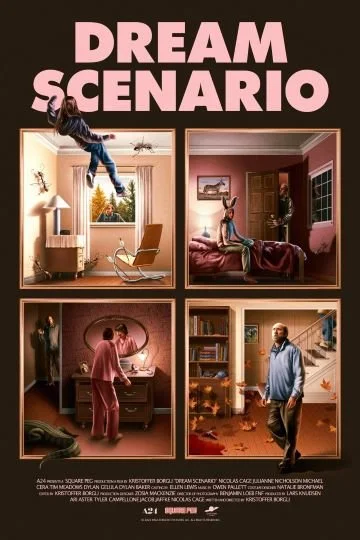Rapid Eye Fame, Rapid Eye Shame
Mina Miljanić
"Dream Scenario" is a satirical surreal drama, as well as the first American film by Norwegian director Kristoffer Borgli, who also directed, wrote, and edited it. The film premiered at the Toronto Film Festival in 2023, and the fact that it was produced by the renowned A24 studio, and produced under the supervision of Ari Aster and Lars Knudsen, suggests that it addresses a specific, carefully profiled audience. The decision for Nicolas Cage to interpret the main character further intensifies the interest of viewers who are eager for quirky humor.
The protagonist, Paul Matthews, is a frustrated, middle-aged professor of evolutionary biology, whose life is suddenly and inexplicably turned upside down when he begins to appear in the dreams of completely unknown people around the world. Although his fame initially is flattering to him, because it fills the void caused by professional and personal dissatisfaction, as the perception of the public begins to change abruptly, he too falls deeper down the rabbit hole. The line between sleep and reality becomes blurred, his marriage falls apart, and Paul, like many in the modern era of the so-called cancel culture, becomes a victim of a system that celebrates the individual only to soon reject him.
Borgli’s stamp as an author has been known to us since his debut work "Sick of Myself", where he showed interest in the way modern society functions, through the commercialization of everyday life and obsession with attention. The director shows here that he knows how to implement a narrative in an unpredictable, humorous and disturbing direction, which consolidates him as one of the more specific voices of European film. When Borgli in further work decides on a surreal framework with a basis in the unconscious and dream-like states, the possibilities are almost unlimited, everything is open to interpretation, and any symbolism is allowed. Dream scenes are therefore visually striking, unstable landscapes, unusual perspectives and symbolic phenomena that, with a refined composition of frames, thoughtful camera angles and editing rhythm, form the astonishment and discomfort of a typical dream. It is precisely because of this breadth that the "Dream Scenario" is rampant and entertaining, with unexpected developments, but in the third act - where it should get to the point and culminate - it begins to lose focus, which leaves an impression of emptiness and thematic dispersion.
During the epilogue, it becomes clear that the controversial dreams about Paul have ceased, and his experience led to the discovery of a common subconscious, which further encourages
the idea that dreams are used as advertising space with the help of technology. Paul goes to France for a tour to promote his new book, but a new humiliation awaits him there: the book was renamed I Am Your Nightmare without his knowledge, which is a poor and superficial interpretation of the original. In the end, the film seems to lose the power of its own idea, so instead of an emotional or thematic climax, it enters the sphere of rationalization.
Becoming a symbol of something you never wanted, losing control of your own identity, questioning the boundaries between inner authenticity and social perception, are all thematic frameworks that Borgli well conveys according to the postulates of the craft. Despite the richness of ideas and motives, as well as visual poetry, the film denies emotional release, and instead of catharsis, we remain stuck in a feeling of discomfort. Perhaps this is his most sincere lesson, the realisation that we too, like Paul Matthews, go through life as through a lucid dream that we believe we control, while in reality, something else guides us.

